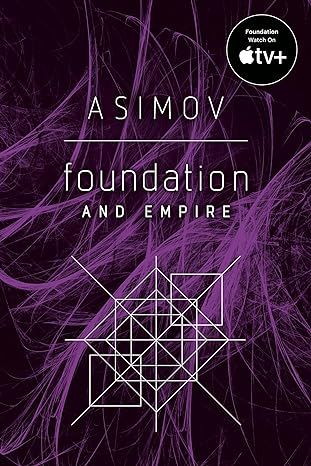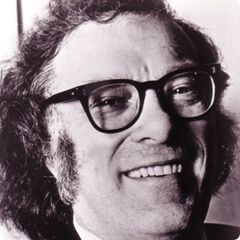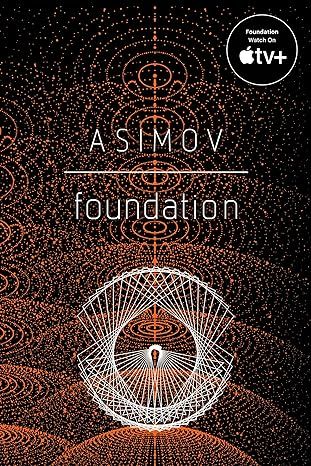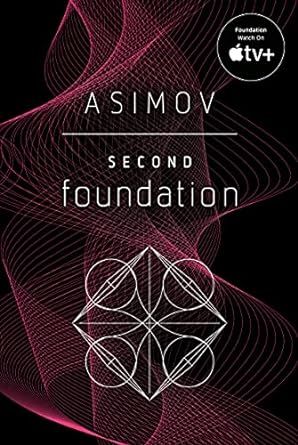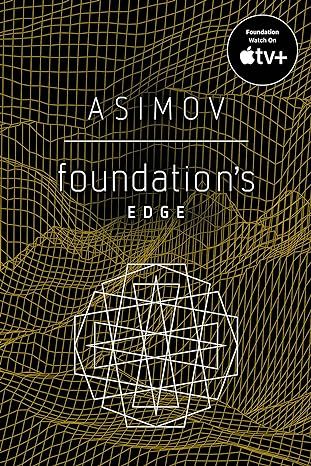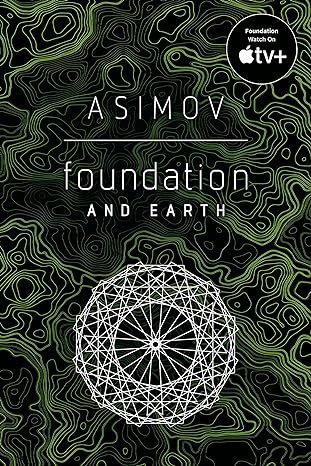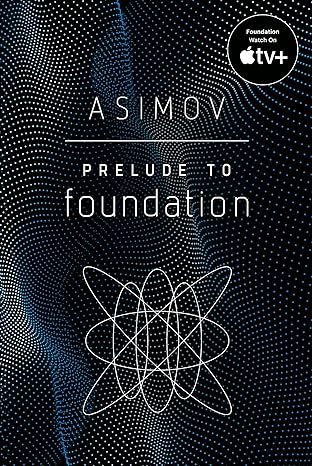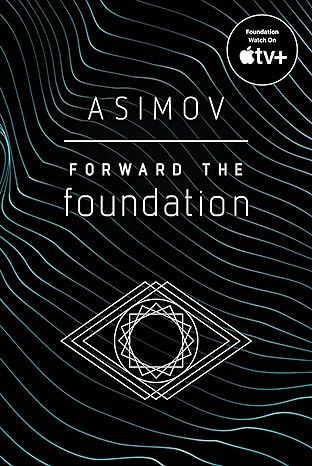Foundation and Empire
4.5
-
12,487 ratings
The second novel in Isaac Asimov’s classic science-fiction masterpiece, the Foundation series
THE EPIC SAGA THAT INSPIRED THE APPLE TV+ SERIES FOUNDATION
Led by its founding father, the psychohistorian Hari Seldon, and utilizing science and technology, the Foundation survived the greed and barbarism of its neighboring warrior-planets. Now cleverness and courage may not be enough. For the Empire—the mightiest force in the Galaxy—is even more dangerous in its death throes. Even worse, a mysterious entity called the Mule has appeared with powers beyond anything humanly conceivable. Who—or what—is the Mule? And how is humanity to defend itself against this invulnerable avatar of annihilation?
Filled with nail-biting suspense, nonstop action, and cutting-edge speculation, Foundation and Empire is the story of humanity’s perpetual struggle against the darkness that forever threatens to overwhelm the light—and of how the courage of even a determined few can make all the difference in the universe.
Kindle
$8.99
Available instantly
Audiobook
$0.00
with membership trial
Hardcover
$70.89
Paperback
$11.54
Ships from
Amazon.com
Payment
Secure transaction
ISBN-10
0553382586
ISBN-13
978-0553382587
Print length
272 pages
Language
English
Publisher
Del Rey; Spectra
Publication date
April 28, 2008
Dimensions
5.48 x 0.57 x 8.21 inches
Item weight
11.2 ounces
Frequently bought together
Popular Highlights in this book
Gratitude is best and most effective when it does not evaporate itself in empty phrases.
Highlighted by 1,614 Kindle readers
After all, the essential point in running a risk is that the returns justify it.
Highlighted by 1,102 Kindle readers
Married life had taught Toran the futility of arguing with a female in a dark-brown mood.
Highlighted by 874 Kindle readers
Product details
ASIN :
B000FC1PWK
File size :
5040 KB
Text-to-speech :
Enabled
Screen reader :
Supported
Enhanced typesetting :
Enabled
X-Ray :
Enabled
Word wise :
Enabled
Sample
BEL RIOSE. . . . In his relatively short career, Riose earned the title of "The Last of the Imperials" and earned it well. A study of his campaigns reveals him to be the equal of Peurifoy in strategic ability and his superior perhaps in his ability to handle men. That he was born in the days of the decline of Empire made it all but impossible for him to equal Peurifoy's record as a conqueror. Yet he had his chance when, the first of the Empire's generals to do so, he faced the Foundation squarely. . . .
Encyclopedia Galactica
Chapter One
Search for Magicians
Bel Riose traveled without escort, which is not what court etiquette prescribes for the head of a fleet stationed in a yet-sullen stellar system on the Marches of the Galactic Empire.
But Bel Riose was young and energetic—energetic enough to be sent as near the end of the universe as possible by an unemotional and calculating court—and curious besides. Strange and improbable tales fancifully repeated by hundreds and murkily known to thousands intrigued the last faculty; the possibility of a military venture engaged the other two. The combination was overpowering.
He was out of the dowdy ground-car he had appropriated and at the door of the fading mansion that was his destination. He waited. The photonic eye that spanned the doorway was alive, but when the door opened it was by hand.
Bel Riose smiled at the old man. "I am Riose—"
"I recognize you." The old man remained stiffly and unsurprised in his place. "Your business?"
Riose withdrew a step in a gesture of submission. "One of peace. If you are Ducem Barr, I ask the favor of conversation."
Ducem Barr stepped aside and in the interior of the house the walls glowed into life. The general entered into daylight.
He touched the wall of the study, then stared at his fingertips. "You have this on Siwenna?"
Barr smiled thinly. "Not elsewhere, I believe. I keep this in repair myself as well as I can. I must apologize for your wait at the door. The automatic device registers the presence of a visitor but will no longer open the door."
"Your repairs fall short?" The general's voice was faintly mocking.
"Parts are no longer available. If you will sit, sir. You drink tea?"
"On Siwenna? My good sir, it is socially impossible not to drink it here."
The old patrician retreated noiselessly with a slow bow that was part of the ceremonious legacy left by the aristocracy of the last century's better days.
Riose looked after his host's departing figure, and his studied urbanity grew a bit uncertain at the edges. His education had been purely military; his experience likewise. He had, as the cliche has it, faced death many times; but always death of a very familiar and tangible nature. Consequently, there is no inconsistency in the fact that the idolized lion of the Twentieth Fleet felt chilled in the suddenly musty atmosphere of an ancient room.
The general recognized the small black-ivroid boxes that lined the shelves to be books. Their titles were unfamiliar. He guessed that the large structure at one end of the room was the receiver that transmuted the books into sight-and-sound on demand. He had never seen one in operation; but he had heard of them.
Once he had been told that long before, during the golden ages when the Empire had been co-extensive with the entire Galaxy, nine houses out of every ten had such receivers—and such rows of books.
But there were borders to watch now; books were for old men. And half the stories told about the old days were mythical anyway. More than half.
The tea arrived, and Riose seated himself. Ducem Barr lifted his cup. "To your honor."
"Thank you. To yours."
Ducem Barr said deliberately, "You are said to be young. Thirty-five?"
"Near enough. Thirty-four."
"In that case," said Barr, with soft emphasis, "I could not begin better than by informing you regretfully that I am not in the possession of love charms, potions, or philtres. Nor am I in the least capable of influencing the favors of any young lady as may appeal to you."
"I have no need of artificial aids in that respect, sir." The complacency undeniably present in the general's voice was stirred with amusement. "Do you receive many requests for such commodities?"
"Enough. Unfortunately, an uninformed public tends to confuse scholarship with magicianry, and love life seems to be that factor which requires the largest quantity of magical tinkering."
"And so would seem most natural. But I differ. I connect scholarship with nothing but the means of answering difficult questions."
The Siwennian considered somberly, "You may be as wrong as they!"
"That may turn out or not." The young general set down his cup in its flaring sheath and it refilled. He dropped the offered flavor-capsule into it with a small splash. "Tell me then, patrician, who are the magicians? The real ones."
Barr seemed startled at a title long unused. He said, "There are no magicians."
"But people speak of them. Siwenna crawls with the tales of them. There are cults being built about them. There is some strange connection between it and those groups among your countrymen who dream and drivel of ancient days and what they call liberty and autonomy. Eventually the matter might become a danger to the State."
The old man shook his head. "Why ask me? Do you smell rebellion, with myself at the head?"
Riose shrugged, "Never. Never. Oh, it is not a thought completely ridiculous. Your father was an exile in his day; you yourself a patriot and a chauvinist in yours. It is indelicate in me as a guest to mention it, but my business here requires it. And yet a conspiracy now? I doubt it. Siwenna has had the spirit beat out of it these three generations."
The old man replied with difficulty, "I shall be as indelicate a host as you a guest. I shall remind you that once a viceroy thought as you did of the spiritless Siwennians. By the orders of that viceroy my father became a fugitive pauper, my brothers martyrs, and my sister a suicide. Yet that viceroy died a death sufficiently horrible at the hands of these same slavish Siwennians."
"Ah, yes, and there you touch nearly on something I could wish to say. For three years the mysterious death of that viceroy has been no mystery to me. There was a young soldier of his personal guard whose actions were of interest. You were that soldier, but there is no need of details, I think."
Barr was quiet. "None. What do you propose?"
"That you answer my questions."
"Not under threats. I am old enough for life not to mean particularly overmuch."
"My good sir, these are hard times," said Riose, with meaning, "and you have children and friends. You have a country for which you have mouthed phrases of love and folly in the past. Come, if I should decide to use force, my aim would not be so poor as to strike you."
Barr said coldly, "What do you want?"
Riose held the empty cup as he spoke. "Patrician, listen to me. These are days when the most successful soldiers are those whose function is to lead the dress parades that wind through the imperial palace grounds on feast days and to escort the sparkling pleasure ships that carry His Imperial Splendor to the summer planets. I . . . I am a failure. I am a failure at thirty-four, and I shall stay a failure. Because, you see, I like to fight.
"That's why they sent me here. I'm too troublesome at court. I don't fit in with the etiquette. I offend the dandies and the lord admirals, but I'm too good a leader of ships and men to be disposed of shortly by being marooned in space. So Siwenna is the substitute. It's a frontier world; a rebellious and a barren province. It is far away, far enough away to satisfy all.
"And so I moulder. There are no rebellions to stamp down, and the border viceroys do not revolt lately; at least, not since His Imperial Majesty's late father of glorious memory made an example of Mountel of Paramay."
"A strong Emperor," muttered Barr.
"Yes, and we need more of them. He is my master; remember that. These are his interests I guard."
Barr shrugged unconcernedly. "How does all this relate to the subject?"
"I'll show you in two words. The magicians I've mentioned come from beyond—out there beyond the frontier guards, where the stars are scattered thinly—"
" 'Where the stars are scattered thinly,' " quoted Barr, " 'And the cold of space seeps in.' "
"Is that poetry?" Riose frowned. Verse seemed frivolous at the moment. "In any case, they're from the Periphery—from the only quarter where I am free to fight for the glory of the Emperor."
"And thus serve His Imperial Majesty's interests and satisfy your own love of a good fight."
"Exactly. But I must know what I fight; and there you can help."
"How do you know?"
Riose nibbled casually at a cakelet. "Because for three years I have traced every rumor, every myth, every breath concerning the magicians—and of all the library of information I have gathered, only two isolated facts are unanimously agreed upon, and are hence certainly true. The first is that the magicians come from the edge of the Galaxy opposite Siwenna; the second is that your father once met a magician, alive and actual, and spoke with him."
The aged Siwennian stared unblinkingly, and Riose continued, "You had better tell me what you know—"
Barr said thoughtfully, "It would be interesting to tell you certain things. It would be a psychohistoric experiment of my own."
"What kind of experiment?"
"Psychohistoric." The old man had an unpleasant edge to his smile. Then, crisply, "You'd better have more tea. I'm going to make a bit of a speech."
He leaned far back into the soft cushions of his chair. The wall-lights had softened to a pink-ivory glow, which mellowed even the soldier's hard profile.
Ducem Barr began, "My own knowledge is the result of two accidents: the accidents of being born the son of my father, and of being born the native of my country. It begins over forty years ago, shortly after the great Massacre, when my father was a fugitive in the forests of the South, while I was a gunner in the viceroy's personal fleet. This same viceroy, by the way, who had ordered the Massacre, and who died such a cruel death thereafter."
Barr smiled grimly, and continued, "My father was a patrician of the Empire and a senator of Siwenna. His name was Onum Barr."
Riose interrupted impatiently, "I know the circumstances of his exile very well. You needn't elaborate upon it."
The Siwennian ignored him and proceeded without deflection. "During his exile a wanderer came upon him; a merchant from the edge of the Galaxy; a young man who spoke a strange accent, knew nothing of recent Imperial history, and who was protected by an individual force-shield."
"An individual force-shield?" Riose glared. "You speak extravagance. What generator could be powerful enough to condense a shield to the size of a single man? By the Great Galaxy, did he carry five thousand myria-tons of nuclear power-source about with him on a little wheeled gocart?"
Barr said quietly, "This is the magician of whom you hear whispers, stories and myths. The name 'magician' is not lightly earned. He carried no generator large enough to be seen, but not the heaviest weapon you can carry in your hand would have as much as creased the shield he bore."
"Is this all the story there is? Are the magicians born of maunderings of an old man broken by suffering and exile?"
"The story of the magicians antedated even my father, sir. And the proof is more concrete. After leaving my father, this merchant that men call a magician visited a tech-man at the city to which my father had guided him, and there he left a shield-generator of the type he wore. That generator was retrieved by my father after his return from exile upon the execution of the bloody viceroy. It took a long time to find—
"The generator hangs on the wall behind you, sir. It does not work. It never worked but for the first two days; but if you'll look at it, you will see that no one in the Empire ever designed it."
Bel Riose reached for the belt of linked metal that clung to the curved wall. It came away with a little sucking noise as the tiny adhesion-field broke at the touch of his hand. The ellipsoid at the apex of the belt held his attention. It was the size of a walnut.
"This—" he said.
"Was the generator?" nodded Barr. "But it was the generator. The secret of its workings are beyond discovery now. Sub-electronic investigations have shown it to be fused into a single lump of metal and not all the most careful study of the diffraction patterns have sufficed to distinguish the discrete parts that had existed before fusion."
"Then your 'proof' still lingers on the frothy border of words backed by no concrete evidence."
Barr shrugged. "You have demanded my knowledge of me and threatened its extortion by force. If you choose to meet it with skepticism, what is that to me? Do you want me to stop?"
"Go on!" said the general, harshly.
"I continued my father's researches after he died, and then the second accident I mentioned came to help me, for Siwenna was well known to Hari Seldon."
"And who is Hari Seldon?"
"Hari Seldon was a scientist of the reign of the Emperor, Daluben IV. He was a psychohistorian; the last and greatest of them all. He once visited Siwenna, when Siwenna was a great commercial center, rich in the arts and sciences."
"Hmph," muttered Riose, sourly, "where is the stagnant planet that does not claim to have been a land of overflowing wealth in older days?"
"The days I speak of are the days of two centuries ago, when the Emperor yet ruled to the uttermost star; when Siwenna was a world of the interior and not a semi-barbarian border province. In those days, Hari Seldon foresaw the decline of Imperial power and the eventual barbarization of the entire Galaxy."
Riose laughed suddenly. "He foresaw that? Then he foresaw wrong, my good scientist. I suppose you call yourself that. Why, the Empire is more powerful now than it has been in a millennium. Your old eyes are blinded by the cold bleakness of the border. Come to the inner worlds someday; come to the warmth and the wealth of the center."
The old man shook his head somberly. "Circulation ceases first at the outer edges. It will take a while yet for the decay to reach the heart. That is, the apparent, obvious-to-all decay, as distinct from the inner decay that is an old story of some fifteen centuries."
Read more
About the authors
Isaac Asimov
Isaac Asimov was an American author and professor of biochemistry at Boston University, best known for his works of science fiction and for his popular science books. Asimov was prolific and wrote or edited more than 500 books and an estimated 90,000 letters and postcards. His books have been published in 9 of the 10 major categories of the Dewey Decimal Classification.
Asimov wrote hard science fiction and, along with Robert A. Heinlein and Arthur C. Clarke, he was considered one of the "Big Three" science fiction writers during his lifetime. Asimov's most famous work is the Foundation Series; his other major series are the Galactic Empire series and the Robot series. The Galactic Empire novels are explicitly set in earlier history of the same fictional universe as the Foundation series. Later, beginning with Foundation's Edge, he linked this distant future to the Robot and Spacer stories, creating a unified "future history" for his stories much like those pioneered by Robert A. Heinlein and previously produced by Cordwainer Smith and Poul Anderson. He wrote hundreds of short stories, including the social science fiction "Nightfall", which in 1964 was voted by the Science Fiction Writers of America the best short science fiction story of all time. Asimov wrote the Lucky Starr series of juvenile science-fiction novels using the pen name Paul French.
Read more
Reviews
Customer reviews
4.5 out of 5
12,487 global ratings
Mariane Pedreira Munne
5
Classic classy sci-fi
Reviewed in the United States on March 24, 2024
Verified Purchase
Asimov is a master and the Foundation books are page turners. He weaves and paces the story as only a a writer of his caliber is able to do!
Ritesh Laud
5
The continuation of an epic series
Reviewed in the United States on January 19, 2002
Verified Purchase
Foundation and Empire is the second of the original Foundation trilogy written in the 1950s. The first book is Foundation and the last is Second Foundation. I enjoyed Foundation but I liked F&E quite a bit more! Foundation consists of five disconnected short stories, too short for adequate development of the settings or characters. F&E is much more focused, containing only two stories, the second of which really impressed me. A quick refresher on the background: The psychohistorian Hari Seldon was able to mathematically foresee the future of human society in the Milky Way. It wasn't pretty. Socio-economic forces were to cause the total collapse of the Trantorian Empire and lead to 30,000 years of anarchy and barbarism before a new empire restored peace and order. However, Seldon saw an "alternate path" that could reduce the duration of the Dark Ages to a single millennium. He established two societies (called Foundations) to bring this change about. In Foundation, we learn how the fledgling First Foundation established itself after Seldon's death and how it grew powerful. In F&E, Seldon is long dead and the First Foundation faces much more serious threats: a war with the dying but still powerful Trantorian Empire and a war with a mutant leader called The Mule who possesses incredible powers. The part about the war with the Empire is a straightforward narrative with a couple interesting twists. The second part about The Mule takes place a few decades later and is written in the style of a mystery, sort of like the first two Robot novels. Since The Mule is an individual of extraordinary power, Seldon's psychohistorical predictions for the First Foundation are in jeopardy because they deal only with masses of people and large scale socio-economic forces. Hence the second part is a more exciting read. :-) Also, until the end of the second part the Second Foundation is a mysterious society on the other side of the Galaxy about whom we know next to nothing. Although I guessed the nature of The Mule's powers, I did not guess his identity and it was a great surprise for me when it was revealed at the end. The events of the last two chapters are stunning and really make you want to rip into the third book. Yet F&E doesn't end on a cliffhanger and is quite satisfying in and of itself. This unique blend is a testament to Asimov's genius as an author. Also, you'll learn why the mutant calls himself The Mule and it's quite enlightening! With novels written later, Asimov tied together three series into one huge one! I recommend reading the entire 14-book series in the following order: the four Robot novels, the three Empire novels, and the seven Foundation novels (the original trilogy plus two prequels and two sequels). So far I've yet to read the last three Foundation books (Second Foundation, Foundation's Edge, Foundation and Earth), but so far most have been excellent and all have been well above average.
Read more
19 people found this helpful
CyberKnight
5
Who is the fool?
Reviewed in the United States on December 6, 2023
Verified Purchase
Another book full of interesting ideas that traverse from the scientific, to the psychoanalytic, to the psionic. Ideas that people consider to be for the best from many differing points of view, and how disparate they are. How they clash and one example of who could come out on top, which could be many different answers with a slight choice difference by the author. He does a masterful job of showing multifaceted objections of differing worlds and persons within. Rebellions that are, and those that could be. In spite of the older writing style, in the end this book brings to light things that can provide some of the most prevalent morals of today, and how treating others kindly can truly make all the difference.
Read more
DcLonChi
5
30 years on -- a great, but different, read
Reviewed in the United States on July 28, 2016
Verified Purchase
I'm reading the original Foundation trilogy for the 3rd (or maybe 4th?) time, but the first time in at least 20 years. I've got a few points to note, in no particular order:
-
Old science fiction tells us so much about the past. The things they never thought would change -- cigarettes, newspapers, women in the home, microfilm (!) -- show us just how prominent our blind spots can be. And the things they didn't even dream of (most obviously, the internet, but also race and s*xual relations, cell phones, etc.) tell us just how far and how quickly things change.
-
Reading it the first (and 2nd) time through, the young ambitious Federation reminded me of the USA -- young, resourceful, growing, upstarts. Now, I read it and the dying, corrupt, Empire reminds me of the USA. I'm not sure if this is my getting older (and pessimistic) or whether the times have changed so much since the 40s and 50s. In any case, there's an optimism in these books (like a lot of old sci-fi) that has long since passed out of (American?) pop culture.
-
There's a funny disconnect between 1 and 2 -- and I'm not sure where it is. So much has improved for so many, and yet the future now seems more scary than ever. Part of me reads this as escapist fun, part of me reads it to try to exercise my powers of optimism. (Without starting any arguments about current politics or which apocalyptic future I fear, let me say that I grew up in the Cold War with a very real fear of dying in a nuclear war -- the only bright side being that living in DC meant that I'd be incinerated instantly, and not suffer a lingering post-war death. Are any our current fears more likely or more catastrophic than that?)
-
There is little emotional depth in the Foundation. We don't get outsiders or brooding introspection, we learn about the characters through what they do. It reminds me a bit of the Icelandic sagas I just finished reading: lots of who did what, over how many generations -- and while there's little internal monologueing, you see that actions give insight into character. Perhaps it's our blind spot now to to think that how things feel to you is the most important thing in the world.
-
The Mule seems -- to my eyes -- a portent of 1960's. Without giving any spoilers, suddenly everyone sees that people's feelings are far more important and disruptive than any technology. (And the visi sonor seems so close to a depiction of an LSD trip that it makes me wonder what was going on in Asimov's personal life around this time!)
In conclusion, I encourage any old fans to pick up and re-read the series: you'll get something different out of it than the last time.
Read more
26 people found this helpful
Nicholas Ritter
4
The ending is worth it.
Reviewed in the United States on March 11, 2015
Verified Purchase
Long story short, I had a more difficult time getting into the characters and storyline than 'Foundation', but man did it pick up in the second half. It seems the book finally converged on a set of protagonists in the latter half of the book, and crescendoed to a satisfying end.
Reading Isaac Asimov's writing is like eating a lean cut of meat. Sure, I enjoy the occasional juicy, fatty steak, with its meticulously crafted settings and deep character development, but Asimov wastes no time. He'll stop to add a bit of depth and explanation here and there, but that's all, and the plot progresses at a blistering pace. It makes sense though. 'Foundation' introduced some of the most compelling concepts I have ever read, and this book follows suit. But this is why I ultimately give this book 4 rather than 5 stars. It was not its predecessor.
While the book adds more detail to Hari Seldons plan for the Galaxy, it was not nearly as progressive as 'Foundation's' ideas on psychohistory and cultural evolution. Nevertheless, 'Foundation and Empire' delivers many new elements and beautifully sets the stage for for the finale, 'Second Foundation'.
It's amazing how a series published in the '50s can seem so new to me. So far Asimov's precise and deliberate writing style combined with a truly unique story has blown me away. I cannot wait to learn how Seldons plan continues in the final book. If you haven't read 'Foundation', you're missing out. If you have, I wholeheartedly encourage you to continue and power through the first half of 'Foundation and Empire'. Then, savor the building anticipation for whomever and wherever the Second Foundation is inconspicuously spreading its dominance!
Read more
2 people found this helpful
Top Isaac Asimov titles
Best Sellers

The Great Alone: A Novel
4.6
-
152,447
$5.49

The Four Winds
4.6
-
156,242
$9.99

Winter Garden
4.6
-
72,838
$7.37

The Nightingale: A Novel
4.7
-
309,637
$8.61

Steve Jobs
4.7
-
24,596
$1.78

Iron Flame (The Empyrean, 2)
4.6
-
164,732
$14.99

A Court of Thorns and Roses Paperback Box Set (5 books) (A Court of Thorns and Roses, 9)
4.8
-
26,559
$37.99

Pretty Girls: A Novel
4.3
-
88,539
$3.67

The Bad Weather Friend
4.1
-
34,750
$12.78

Pucking Around: A Why Choose Hockey Romance (Jacksonville Rays Hockey)
4.3
-
41,599
$14.84

Start with Why: How Great Leaders Inspire Everyone to Take Action
4.6
-
37,152
$9.99

Tomorrow, and Tomorrow, and Tomorrow: A novel
4.4
-
95,875
$13.99

Weyward: A Novel
4.4
-
27,652
$11.99

Tom Lake: A Reese's Book Club Pick
4.3
-
37,302
$15.74

All the Sinners Bleed: A Novel
4.4
-
12,894
$13.55

The Mystery Guest: A Maid Novel (Molly the Maid)
4.3
-
9,844
$14.99

Bright Young Women: A Novel
4.2
-
8,485
$14.99

The Wager: A Tale of Shipwreck, Mutiny and Murder (Random House Large Print)
4.5
-
28,672
$14.99

Hello Beautiful (Oprah's Book Club): A Novel (Random House Large Print)
4.4
-
79,390
$14.99

Small Mercies: A Detective Mystery
4.5
-
16,923
$10.00

Holly
4.5
-
31,521
$14.99

The Covenant of Water (Oprah's Book Club)
4.6
-
69,712
$9.24

Wellness: A novel
4.1
-
3,708
$14.99

The Art Thief: A True Story of Love, Crime, and a Dangerous Obsession
4.3
-
4,805
$14.99
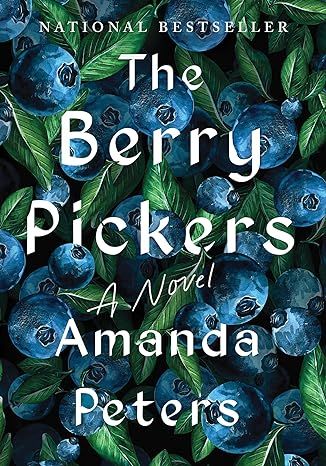
The Berry Pickers: A Novel
4.5
-
14,209
$14.99
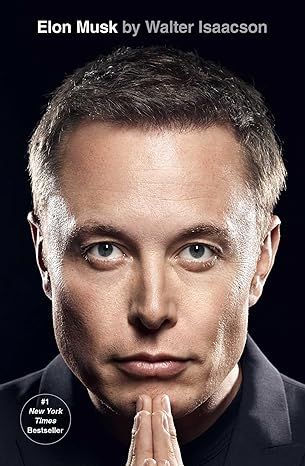
Elon Musk
4.7
-
15,272
$16.99

Just for the Summer
4.6
-
19,524
$11.99
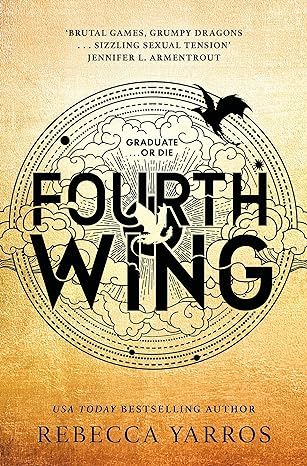
Fourth Wing (International Edition)
4.8
-
206,495
$7.95
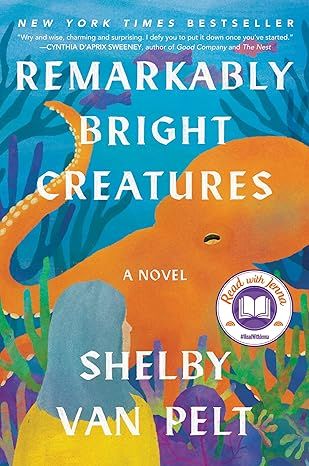
Remarkably Bright Creatures: A Read with Jenna Pick
4.6
-
65,556
$15.80

Tell Me Your Life Story, Mom: A Mother’s Guided Journal and Memory Keepsake Book (Tell Me Your Life Story® Series Books)
4.7
-
5,107
$11.24
